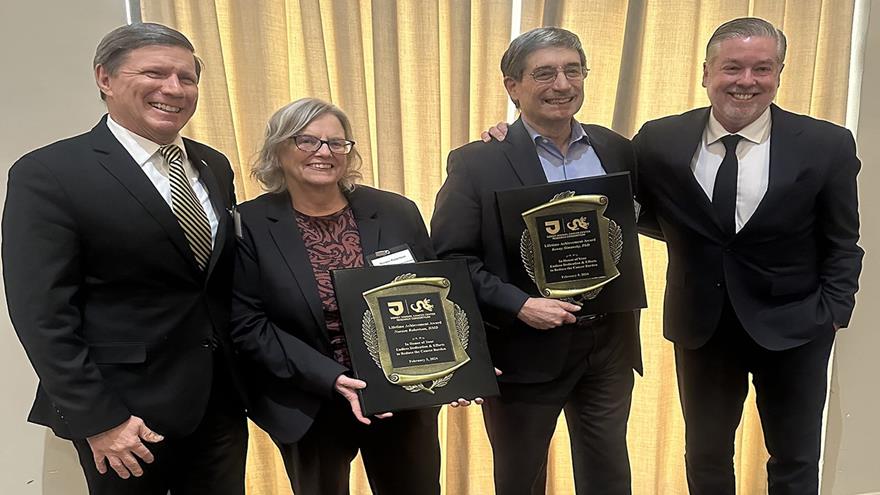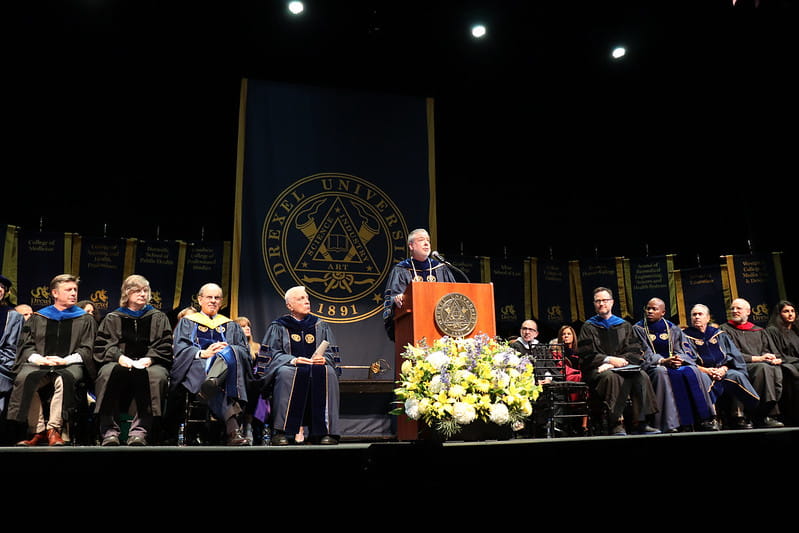100th Anniversary of Co-op Kicks Off at Convocation

- Bolstered by Research Consortium with Drexel, Jefferson’s Sidney Kimmel Cancer Center Earns NCI Comprehensive Cancer Center Designation
- Alyssa Kemp Named as 2024 Truman Scholar
- Faculty Highlights: Recent Awards and Grants
- Ribbon-Cutting Ceremony Marks Official Unveiling of Drexel Station at 30th Street

The Convocation event on Sept. 26 featured all the regalia, pageantry and sentiments that come with a new academic year, but this year’s ceremony also emphasized how the co-op program has set the Drexel education apart for a century.
The event commenced with a procession by University administration and key faculty and staff, the presentation of colors by Drexel’s ROTC Color Guard, a rousing rendition of “The Star-Spangled Banner” by Perry Brisbon, adjunct Instructor in the Westphal College of Media Arts & Design, and an invocation provided by Fr. Carlos Keen, chaplain for the Drexel Newmann Catholic Community.
After a welcoming address from M. Brian Blake, PhD, executive vice president and Nina Henderson Provost, Drexel University President John Fry acknowledged the special theme of this year’s ceremony. He explained that the co-op program was founded as a way for the institution to support the post-WWII economy, and it still to this day prepares Drexel students to tackle society’s most complex problems in a rapidly changing workforce.
“It’s often been said that the best way to learn is by doing, and we know that by doing, that informs how we learn,” he added. “That’s part of our greatness as a University.”
To provide more context to this rich history of co-op, Scott Knowles, PhD, department head and professor of history in the College of Arts and Sciences, gave a keynote address on the ways in which Drexel and its co-op program — both historically and today — can affect change in times of “great crisis.”
These were the words, Knowles elaborated, that Drexel’s second president, Hollis Godfrey, used to describe post-war American in 1919, and that Knowles compared to the crises of today around gun violence, climate change and human rights.
“Godfrey imagined that cooperative students would spend time in classes but also on the factory floor, at the lab bench — the structure of their educational program would itself be a marriage of the theoretical and the applied,” Knowles said. “But we must be careful not to leave out of the history Godfrey’s sense of why it was so important for cooperative-education graduates to join the ranks of industry and government in that unsettled time: It was to them, Godfrey believed, that fell the challenges of forging ahead with industrial progress, protecting and expanding democracy and preventing future wars. That was pretty bold, in a crucial way it was a re-invention of the [Drexel] Institute.”
Knowles added that it is important to rediscover our institutional history, like reflecting on the co-op program’s founding and past, as it “is a foundation upon which to build the University that we want to see in the future.”
“We have before us the example of our history, of 1919 and the decades and changes that have made co-op more inclusive, more international, more diverse and stronger since then,” he said. “We can bring that history to bear on our moment in time.”
Following subsequent addresses from Drexel Board of Trustees Chair Richard Greenawalt ’66 and Faculty Senate Chair Kevin Owens, PhD, closing remarks were offered by Sumita Gangwani, an undergraduate student in the College of Arts and Sciences. Gangwani touched on the student perspective of the co-op anniversary, as well as the relevance and importance of a co-op education to her and her peers.
“My co-op experiences have arguably been the best opportunities of my life,” she said, outlining opportunities she had during her time at Drexel to work in the IKEA US headquarters as well as with the Exelon Corporation here in Philadelphia. “My experiences are much more than bullets on a résumé. They opened my mind to creative thinking and using ideas to support strategic decisions. … These experiences are not just memories. They are moments of impact that make us the leaders we are today.”
Gangwani’s parting words of wisdom were simple: “thrive in discomfort.” This was a hard lesson, she said, having grown up nearby in the suburbs of Philadelphia and still feeling the comfort of “home” when coming here to Drexel.
“That comfort is not what got me here today,” she said. “It was the classes I walked into knowing nothing about. It was applying to organizations I had never heard of, and it was walking into an international company at the age of 19. Your growth does not happen overnight, and it can’t happen in the place you call home.
Click here to view a gallery of photos from Convocation 2019.
In This Article
Drexel News is produced by
University Marketing and Communications.
